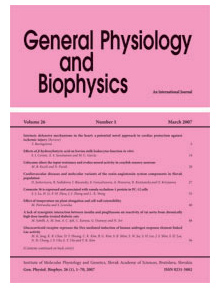Journal info
Aims and Scope |
||
Select Journal
Journals
Bratislava Medical Journal Endocrine Regulations General Physiology and Biophysics 2024 2023 2022 2021 2020 2019 2018 2017 2016 2015 2014 2013 2012 2011 2010 2009 2008 2007 Neoplasma Acta Virologica Studia Psychologica Cardiology Letters Psychológia a patopsych. dieťaťa Kovove Materialy-Metallic Materials Slovenská hudbaWebshop Cart
Your Cart is currently empty.
Info: Your browser does not accept cookies. To put products into your cart and purchase them you need to enable cookies.
General Physiology and Biophysics Vol.39, No.5, p.407–417, 2020 |
||
| Title: Tetrahydroxystilbene glucoside protects against LPS-induced endothelial dysfunction via inhibiting RhoA/ROCK signaling and F-actin remodeling | ||
| Author: Y. Qi, X. Liang, X. Hu, H. He, L. Tang, W. Yao | ||
| Abstract: We analyzed the role of the RhoA/ROCK pathway in regulating endothelial dysfunction triggered by LPS and the protective effects of TSG (2, 3, 5, 4’-tetrahydroxystilbene-2-O-β-D-glucoside). Human umbilical vein endothelial cells (HUVECs) were treated with LPS at different concentrations or at different time points. Cells were also pretreated with 30 μM ROCK inhibitor Y27632 for 30 min or different concentrations of TSG for 24 h and then were incubated with 100 μg/ml LPS for another 24 h. The results showed that LPS treatment significantly reduced endothelial cell viability, increased LDH release, and promoted cell necrosis in a dose- and time-dependent manner, which was dramatically inhibited by TSG pretreatment. Furthermore, LPS induction significantly enhanced the expression of RhoA, ROCK1, and ROCK2 and the activation of ROCK; these effects were reduced by TSG pretreatment. The suppression of either RhoA or ROCK significantly improved LPS-induced endothelial cell viability, and reduced cell necrosis and LDH release. In addition, LPS treatment promoted F-actin skeleton rearrangement and contraction ring formation around the plasma membrane, which was greatly inhibited by the suppression of the RhoA/ROCK pathway or TSG pretreatment. In conclusion, TSG may inhibit F-actin cytoskeletal remodeling by blocking RhoA/ROCK signaling and thus reduce LPS-induced endothelial cell toxicity. |
||
| Keywords: Tetrahydroxystilbene glucoside, RhoA/ROCK pathway, LPS, Actin, Endothelial dysfunction | ||
| Published online: 05-Oct-2020 | ||
| Year: 2020, Volume: 39, Issue: 5 | Page From: 407, Page To: 417 | |
| doi:10.4149/gpb_2020028 |
||
|
|
 download file download file |
|

